Spring和SpringBoot关系
关系:Spring Boot构建在Spring之上,兼容并继承了原生Spring框架的特性和功能。通过Spring Boot,开发者无需手动配置太多内容,可以快速搭建基于Spring的应用程序。同时,Spring Boot与Spring紧密结合,可以方便地使用Spring的各种特性和扩展组件。
总而言之,Spring Boot是对Spring的拓展和增强,旨在简化Spring应用程序的开发和部署。Spring和Spring Boot共同构成了一个强大、灵活且易于使用的Java应用程序开发生态系统。
1.1 学习Spring的什么知识
- 简化开发
- 事务处理
- IOC(控制反转)
- AOP(面向切面编程)
- 框架整合
-
MyBatis
-
MyBatis-plus
-
Struts
-
Struts2
-
Hibernate
-
……
1.3 怎么学
- 学习Spring框架设计思想
- 学习基础操作,思考操作与设计思想间的联系
- 学习案例,熟练应用操作的同时,体会设计思想
2 Spring初认识
目前我们使用的是Spring几版本?
从官网发现以及到了6.x
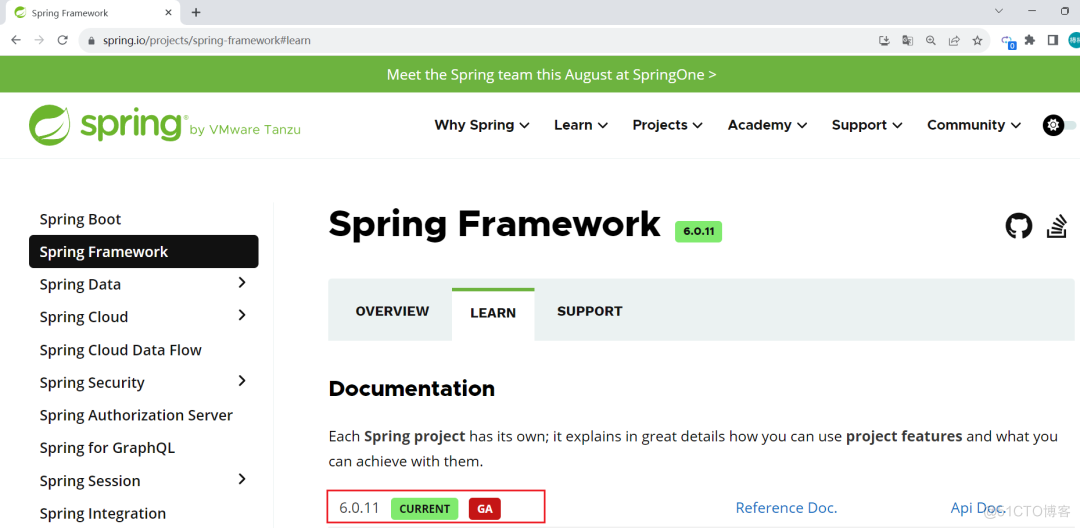
2.1 Spring家族
- 官网:https://spring.io
- Spring发展到今天已经形成了一种开发的生态圈,Spring提供了若干个项目,每个项目用于完成特定的功能。
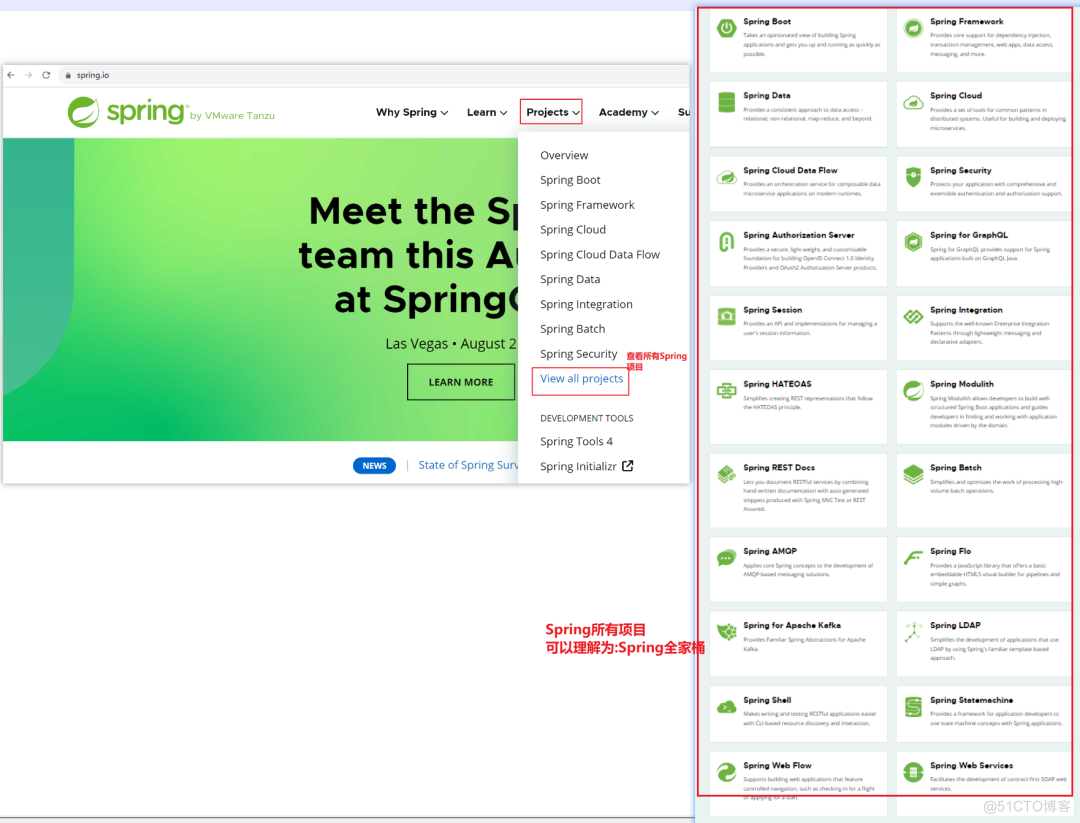
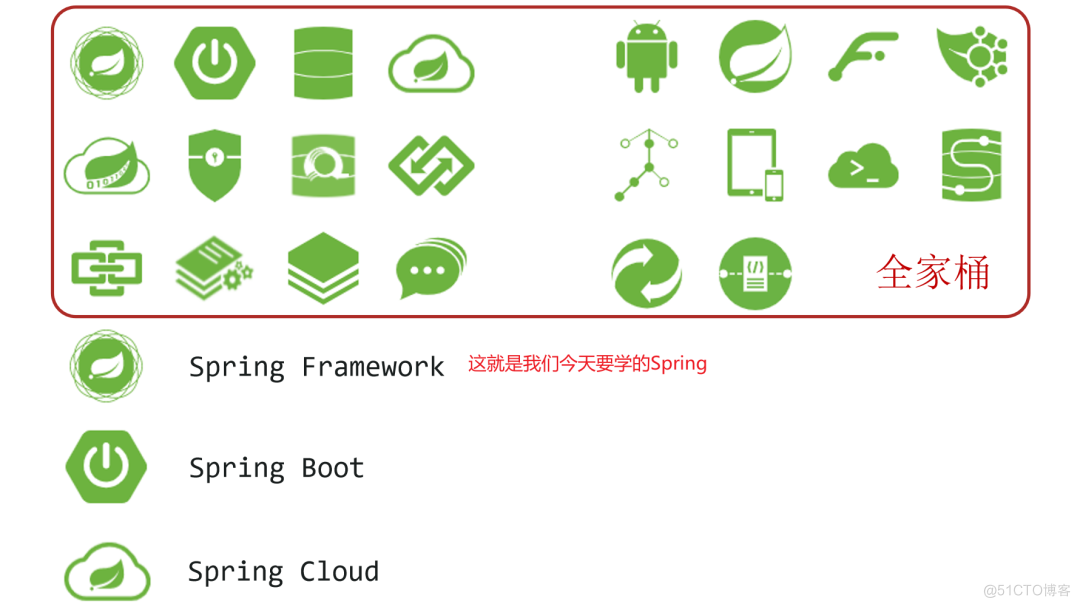
3 Spring体系结构
问题导入
通过系统架构图,Spring能不能进行数据层开发?Spring能不能进行web层开发?
3.1 Spring Framework系统架构图
- Spring Framework是Spring生态圈中最基础的项目,是其他项目的根基
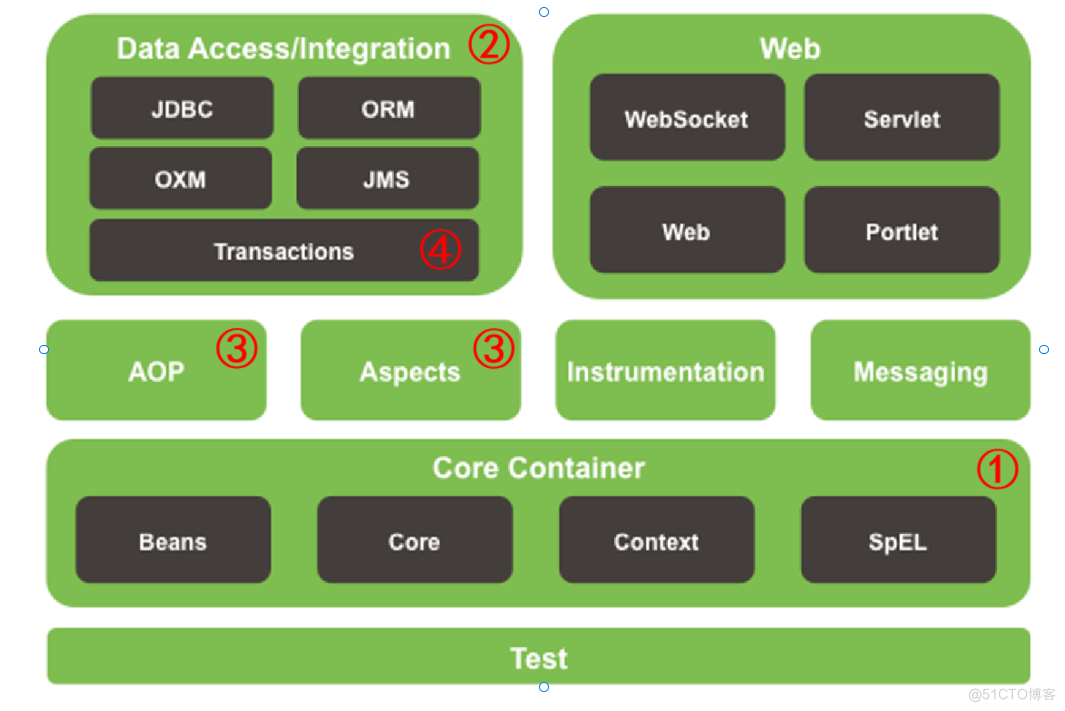
3.2 Spring Framework如何学习
- 1.核心容器
- 核心概念IOC/DI
- 容器基本操作
- 2.AOP
-
AOP概念
-
AOP基本操作
-
3.Spring事务
-
事务使用
-
4.整合第三方框架
-
整合数据框架MyBatis
4 Spring核心概念
问题1:目前我们的代码存在什么问题以及怎么解决这些问题?
思考:什么是IoC,什么是DI?
4.1 目前我们代码存在的问题

从上图思考问题:如果因为业务需要StudentServiceImpl,需要一个新的StudentDao实现 StudentDaoImpl2,name我们就需要在StudentServiceImpl中修改代码,也就是修改
//创建成员对象
private StudentDao studentDao = new StudentDaoImpl2();出现问题:
- 代码书写现状
- 耦合度偏高
- 解决方案
-
使用对象时,在程序中不要主动使用new产生对象,转换为由外部提供对象
4.2 核心概念
-
IOC(Inversion of Control)控制反转
使用对象时,由主动new产生对象转换为由外部提供对象,此过程中对象创建控制权由程序转移到外部,此思想称为控制反转。通俗的讲就是“将new对象的权利交给Spring,我们从Spring中获取对象使用即可” - Spring技术对IoC思想进行了实现
- Spring提供了一个容器,称为IOC容器,用来充当IoC思想中的“外部”
- IOC容器负责对象的创建、初始化等一系列工作,被创建或被管理的对象在IoC容器中统称为Bean对象
- DI(Dependency Injection)依赖注入
-
在容器中建立bean与bean之间的依赖关系的整个过程,称为依赖注入。

- 目标:充分解耦
- 使用IoC容器管理bean(IOC)
- 在IoC容器内将有依赖关系的bean进行关系绑定(DI)
- 最终效果
-
使服务器托管网用对象时不仅可以直接从IoC容器中获取,并且获取到的bean已经绑定了所有的依赖关系
二、IOC和DI入门案例【重点】
1 IOC入门案例【重点】
思考:Spring中的IOC代码如何实现?
1.1 门案例思路分析
- 管理什么?(Service与Dao)
- 如何将被管理的对象告知IOC容器?(配置文件)
- 被管理的对象交给IOC容器,如何获取到IoC容器?(接口)
- IOC容器得到后,如何从容器中获取bean?(接口方法)
- 使用Spring导入哪些坐标?(pom.xml)
1.2 实现步骤
【第一步】导入Spring坐标
【第二步】定义Spring管理的类(接口)
【第三步】创建Spring配置文件,配置对应类作为Spring管理的bean对象
【第四步】初始化IOC容器(Spring核心容器/Spring容器),通过容器获取bean对象- 项目结构
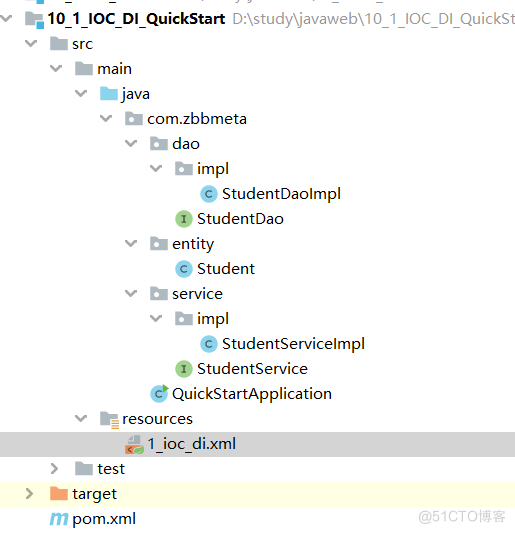
- 创建maven模块
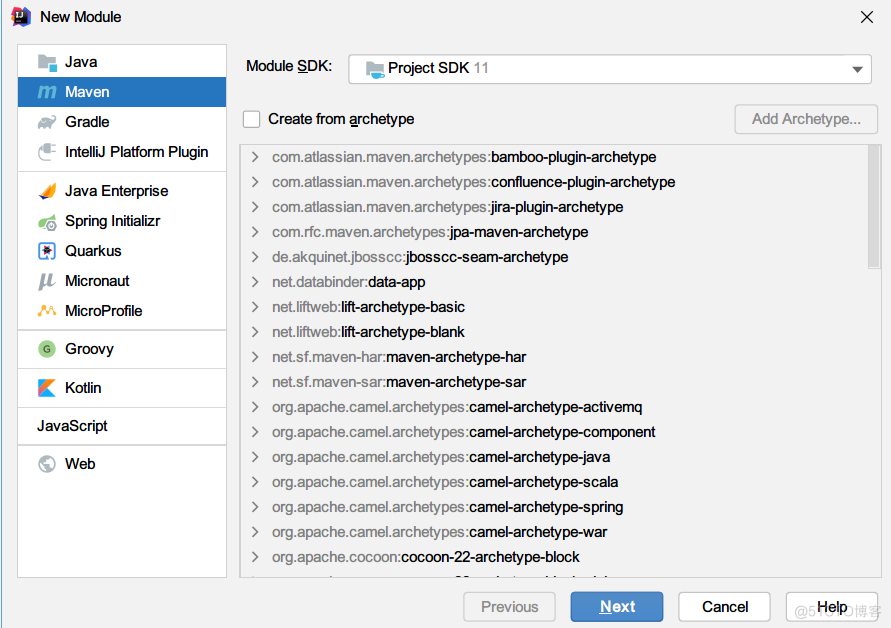
- Student实体类
1.3 实现代码
【第0步】导入Spring坐标
org.springframework
spring-context
5.3.15
org.junit.jupiter
junit-jupiter
5.8.2
test
org.projectlombok
lombok
1.18.28
【第一步】导入Student实体类
@Data
@ToString
@AllArgsConstructor
public class Student {
private String name;
private String address;
private Integer age;
private Integer status;
}【第二步】定义Spring管理的类(接口)
- StudentDao接口和StudentDaoImpl实现类
package com.zbbmeta.dao;
public interface StudentDao {
/**
* 添加学生
*/
void save();
}package com.zbbmeta.dao.impl;
import com.zbbmeta.dao.StudentDao;
public class StudentDaoImpl implements StudentDao {
@Override
public void save() {
System.out.println("DAO: 添加学生信息到数据库...");
}
}- StudentService接口和StudentServiceImpl实现类
package com.zbbmeta.service;
public interface StudentService {
/**
* 添加学生
*/
void save();
}package com.zbbmeta.service.impl;
import com.zbbmeta.dao.StudentDao;
import com.zbbmeta.dao.impl.StudentDaoImpl;
import com.zbbmeta.service.StudentService;
public class StudentServiceImpl implements StudentService {
//创建成员对象
private StudentDao studentDao = new StudentDaoImpl();
@Override
public void save() {
}
}【第三步】创建Spring配置文件在resources目录下,配置对应类作为Spring管理的bean对象
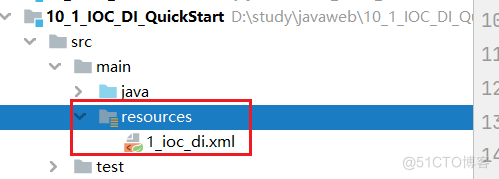

- 定义1_ioc_di.xml配置文件并配置StudentDaoImpl
注意事项:bean定义时id属性在同一个上下文中(IOC容器中)不能重复
【第四步】初始化IOC容器(Spring核心容器/Spring容器),通过容器获取Bean对象
package com.zbbmeta;
import com.zbbmeta.dao.StudentDao;
import org.springframework.context.support.ClassPathXmlApplicationContext;
public class QuickStartApplication {
public static void main(String[] args) {
//1.根据配置文件1_ioc.xml创建IOC容器
ClassPathXmlApplicationContext ac = new ClassPathXmlApplicationContext("1_ioc_di.xml");
//2.从IOC容器里面获取id="studentDao"对象
StudentDao studentDao = (StudentDao) ac.getBean("studentDao");
//3.执行对象方法
studentDao.save();
//4.关闭容器
ac.close();
}
}1.4 运行结服务器托管网果

2 DI入门案例【重点】
思考:Spring中的IOC中已经存在了,studentDao,那么现在如果我还有创建一个bean对象studentService可以像刚才一样直接创建?
不可以,因为studentService中,创建了studentDao对象,所有要将stuentDao注入(DI)到studentService
2.1 DI入门案例思路分析
- 基于IOC管理bean
- Service中使用new形式创建的Dao对象是否保留?(否)
- Service中需要的Dao对象如何进入到Service中?(提供方法)
- Service与Dao间的关系如何描述?(配置)
2.2 实现步骤
【第一步】删除使用new的形式创建对象的代码
【第二步】提供依赖对象对应的setter方法
【第三步】配置service与dao之间的关系2.3 实现代码
【第一步】删除使用new的形式创建对象的代码
package com.zbbmeta.service.impl;
import com.zbbmeta.dao.StudentDao;
import com.zbbmeta.dao.impl.StudentDaoImpl;
import com.zbbmeta.service.StudentService;
public class StudentServiceImpl implements StudentService {
//创建成员对象
//【第一步】删除使用new的形式创建对象的代码,解除对象之间的耦合度
// private StudentDao studentDao = new StudentDaoImpl();
private StudentDao studentDao ;
@Override
public void save() {
System.out.println("Service: 添加学生信息到数据库...");
studentDao.save();
}
}【第二步】提供依赖对象对应的setter方法
package com.zbbmeta.service.impl;
import com.zbbmeta.dao.StudentDao;
import com.zbbmeta.service.StudentService;
public class StudentServiceImpl implements StudentService {
//创建成员对象
//【第一步】删除使用new的形式创建对象的代码,解除对象之间的耦合度
// private StudentDao studentDao = new StudentDaoImpl();
private StudentDao studentDao ;
//【第二步】提供依赖对象对应的setter方法
public void setStudentDao(StudentDao studentDao) {
this.studentDao = studentDao;
}
@Override
public void save() {
System.out.println("Service: 添加学生信息到数据库...");
studentDao.save();
}
}【第三步】配置service与dao之间的关系
在applicationContext.xml中配置
【第四步】初始化IOC容器(Spring核心容器/Spring容器),通过容器获取studentDao对象
package com.zbbmeta;
import com.zbbmeta.service.StudentService;
import org.springframework.context.support.ClassPathXmlApplicationContext;
public class DIApplication {
public static void main(String[] args) {
/**
* //目标:从IOC容器里面获取studentService对象执行
*/
//1.根据配置文件1_ioc.xml创建IOC容器
ClassPathXmlApplicationContext ac = new ClassPathXmlApplicationContext("1_ioc_di.xml");
//2.从IOC容器里面获取id="studentService"对象
StudentService studentService = (StudentService) ac.getBean("studentService");
//3.执行对象方法
studentService.save();
//4.关闭容器
ac.close();
}
}控制台结果

2.4 图解演示
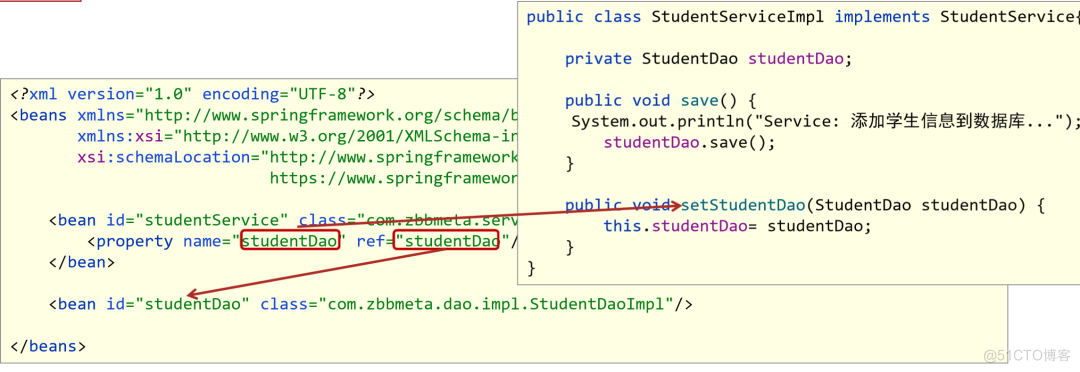
服务器托管,北京服务器托管,服务器租用 http://www.fwqtg.net
机房租用,北京机房租用,IDC机房托管, http://www.fwqtg.net

